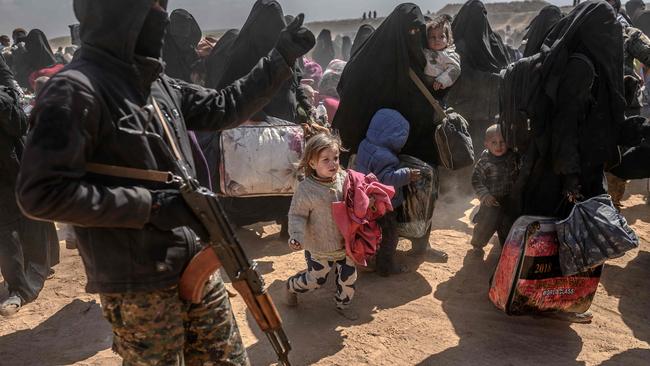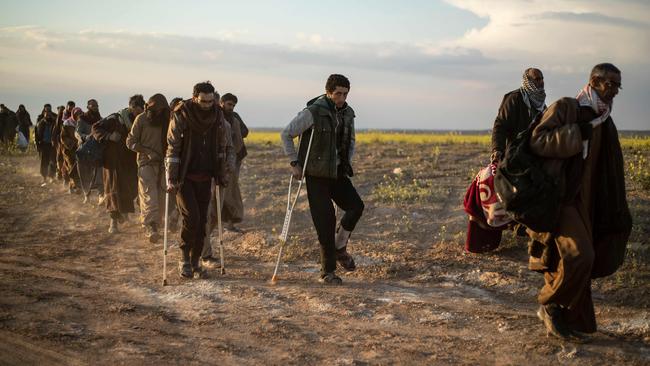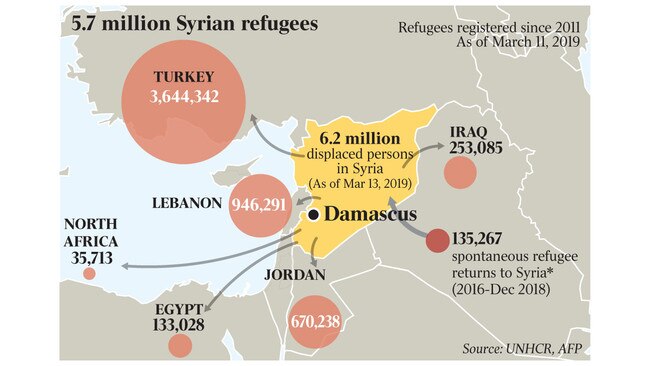Captured Islamic State fighters pose dilemma for Western countries
Australia and other democracies are understandably reluctant to deal with nationals who fought for Islamic State.

Speaking to congress earlier this month, Joseph Votel, the outgoing head of US Central Command, warned that the Islamic State fighters and women who were surrendering in their thousands from the last Syrian enclave of Baghouz were “unrepentant, unbroken and radicalised”.
His remarks reflect the fundamental dilemma in dealing with this threat now that the physical caliphate is all but extinguished. How can countries deal with the ideological attraction of a narrative peddled by those who divide the world into believers and unbelievers, reject the legitimacy of manmade laws and seek to impose on others a form of religious rule on which even jihadists themselves can’t agree?
Even determining who was a fighter among those captured in the drive towards Baghouz and since its encirclement has proved challenging given the dissembling being practised by those who are leaving Islamic State’s last stronghold. Media accounts have been circulating of men who denied being fighters and claimed they were employed only as cooks, drivers or support staff. This move to publicly disassociate oneself from the jihadist cause stood in stark contrast to other media reports of women who maintained that Islamic State remained despite their capture.
Little wonder then that governments are proving reluctant to repatriate nationals of their own country captured on the Syrian battlefield fighting for one of the most violent, anti-Western and intolerant non-state actors of the modern era.
The Syrian Democratic Forces are holding thousands of prisoners; the exact number of Westerners being detained is difficult to tell. Regardless of what the number is, it is likely to be relatively small. And if recent history is anything to go by, the larger long-term security problem will likely come from the repatriated or escaped fighters from regional countries.
So the focus on Western detainees is more about the relative threat they pose, as well as the policy challenges they pose to governments of liberal democracies. The debate focuses not just on security but also on issues such as states’ responsibilities for and obligations to its citizens (although rarely is the obligation of citizens to their state raised), what to do with children taken to Syria by their parents and those allegedly born to Australian citizens once there, as well as the responsibility of individuals for their actions.
It is apposite for Australian terrorists to be tried for their crimes in the countries in which they committed them, but the practicalities of doing so present more than a few obstacles. One Australian has been tried and sentenced to death in Iraq, and an ex-citizen sits in a Turkish jail awaiting the outcome of an extradition request.
But transferring captured Australians from the SDF to be tried under the Syrian legal system is not an option.
That then leaves the option of repatriation to Australia, yet the government is reluctant to do so, largely for two reasons. The first is the need to gather sufficient evidence that is admissible in court to lead to a prosecution, when those captured will go to any length to dissemble and downplay their role in the hope of the legal system upholding the type of manmade laws that they and their organisation specifically reject.
The second issue bedevilling countries whose citizens have joined the Salafist-Jihadist groups such as Islamic State is how to rehabilitate those who have completely rejected not only their own country’s legitimacy but the concept of secular liberalism.
Evidence-gathering takes time and the more time they have before the Islamic State members return, the more chance there is that admissible evidence can be gathered. While the ability to prosecute returning fighters differs from country to country, Australia’s raft of legislative changes has allowed for greater options in dealing with terrorists, from stripping them of the protection of the citizenship of a country whose laws and even legitimacy they have rejected, to prosecuting them simply for being present without good reason in areas such as the cities of Mosul and Raqqa when they were held by Islamic State.

Even with these laws in place, the few people charged after returning to Australia have sought to downplay their involvement with the group. Sydney-based Mehmet Biber pleaded guilty to a foreign incursion offence and received less than five years’ jail, with a 2½-year non-parole period. He claimed that his time with a jihadist group was spent playing soccer, sleeping and twice shooting at cans in a tip. Another Australian, Adam Brookman, who voluntarily returned to the country in 2015, claimed that he was injured in an airstrike and taken to an Islamic State-controlled hospital where the group forced him to work for them. He has yet to stand trial.
But if the ability to gather evidence in the face of dissembling jihadis is challenging, the issue of rehabilitation is of greater concern because of the societal burden that it entails.
One of the aims of the justice system is to rehabilitate offenders, but there are fundamental differences between ordinary criminals and those who join or support religion-based terrorist groups such as Islamic State or al-Qa’ida. The most basic question is whether these individuals exhibit contrition for their actions or whether they remain — in Votel’s words — “unrepentant and radicalised”.
Studies on the success of jihadist rehabilitation within liberal democratic societies are few and far between, largely because of the relatively recent nature of the phenomenon and hence the limited ability to determine genuine rehabilitation, the small sample size, and the difficulty in determining the truth of jihadist’s oral claims regarding their contrition and attitude towards secularism, liberalism and unbelievers.

Different legal systems and approaches to rehabilitation are further challenges in obtaining meaningful insights, let alone comparisons. And even the concept of what a rehabilitated jihadist within a liberal democracy is, can elicit violent disagreement among academics.
In the absence of such studies, sentencing remarks from terrorism trials that have been conducted to date provide a good starting point for discussion. Judges are able to weigh up letters of support and psychiatric and other reports submitted by the defence and weigh them against the evidence and arguments from the prosecution. If the starting point in determining the genuine likelihood for a jihadist to be rehabilitated is their contrition, we should all be genuinely concerned. Of 25 individuals involved in Islamic State-related terrorism cases that have passed through Australian courts and for which there are publicly available court documents, the judges noted complete and genuine contrition was displayed by only four of them.
Judges have become equally circumspect regarding individuals’ prospects for rehabilitation. Of those same 25 individuals, only six were believed to have good prospects for rehabilitation, but in two of those cases the judge had reservations.
Caution in this regard is understandable. When Suhan Rahman pleaded guilty to a charge of attempting to pervert the course of justice in June 2013, the judge said his “prospects of rehabilitation may properly be described as excellent”, yet within two years he had travelled to Syria and been killed fighting for Islamic State.
Khaled Sharrouf joined Islamic State and sent out photographs of his children holding the severed heads of Syrian soldiers before his citizenship was stripped and he was killed in an airstrike.
Yet even though he pleaded guilty in 2009 to a charge of possessing a thing connected with preparation for a terrorist act, a treating psychiatrist offered the view: “He indicated that he did not hold any kind of extreme religious views or any desire to remain involved in organised religious activity … he is unlikely to become involved in a further offence of this kind and he does not need to be detained in a maximum-security setting.” The sentencing judge, based on the information available to him, said: “I accept that the offender has reasonable prospects of rehabilitation, although this must necessarily be a cautious prediction.”
This is not to criticise either the psychiatrist or the judge, simply to point out that, to paraphrase the 1930s US radio show The Shadow, who knows what evil lurks in the hearts of men. Milad Atai, after pleading guilty to aiding and abetting a terrorist act, apologising to the Cheng family for his actions and convincing a psychiatrist to assess that he “apparently no longer holds extremist beliefs endorsing radical jihad or support for the Islamic State”, wrote a letter to the court in which he said “I would like to say I’m not sorry about my action nor I’m regretful about my action … I take back what I said in the box … All praise is due to God. I’m happy with my action … I ask Allah to grant victory to the believers and to destroy those who oppress his slaves.”
Jihadist ideologues such as the widely popular Anwar al-Awlaki have always advocated sabr, or patience among radical Islamists. Contemporary setbacks for jihadist movements are nearly always compared with the military defeats suffered by the Prophet Muhammad and his followers until they ultimately succeeded.
With this in mind, the lesson to be learned from Islamic State’s defeat is that this is simply another phase in radical Islamists’ campaign to institute their distorted view of God’s will on earth.
If individuals don’t display contrition for terrorism-related offences to the satisfaction of the courts, then their continued support for violent jihad must be assumed.
Rodger Shanahan is a research fellow in the West Asia program at the Lowy Institute.


